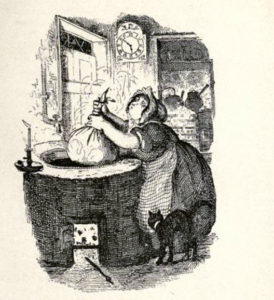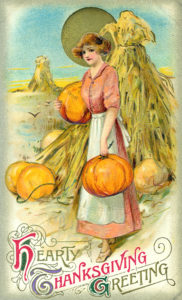I love a bit of perfect timing, and today, we get just that. It begins with a prayer, and here it is:
Stir up, we beseech thee, o Lord, the wills of thy faithful people;
that they, plenteously bringing forth the fruit of good works,
may of thee be plenteously rewarded; through Jesus Christ our Lord. Amen.
Or something to that effect. The language is often updated nowadays, replacing the thees and the plenteouslies with more contemporary words, but I think you get the general idea. It is the collect––the prayer––after communion in the Anglican Church this last Sunday in ordinary time before we shift to the Four Sundays of Advent, our annual time of preparation for Christmas: the time when we make our houses as fair as we are able. The timing of this prayer each year happens to coincide nicely with the ideal timing for the preparation of some traditional English yuletide desserts: in particular, steamed puddings and fruitcakes, which require a good four weeks to age and become sufficiently brandy-soaked to reach their best depth of flavor.
And so, since at least the 1830s, this day has been known as Stir-Up Sunday, both for the collect and also for the celebratory kitchen tasks. Ask folks in the congregation and they may very well have their own version of the collect, which goes more along these lines:
Stir up, we beseech thee, the pudding in the pot,
Stir up, we beseech thee, and keep it all hot.
This is not something we are particularly aware of in my family, Catholics as we are, and Italians, too. But my sister does make a good fruitcake most Christmases, brandy-soaked like the best of them, and she does make it early, long before Christmas’s arrival. Same goes for her delicious Pfeffernüsse, the spicy German cookie that requires weeks to develop its flavors. It is said, though, that a good British Christmas pudding should contain thirteen ingredients––one for Jesus and each of his disciples––no more and no less. And when it is prepared on Stir-Up Sunday, each member of the family should give the pudding a stir, making a wish as they do. The stirring must be from east to west: the same direction the Magi traveled to visit the newborn child.
It is, as well, this 22nd of November, St. Cecilia’s Day. Cecilia, patron saint of musicians. It is traditional to attend a concert on her day, a custom since at least the 16th century in France. This year, though, we know that is not in our best collective interest, and so we wait for perhaps next St. Cecilia’s Day for this particular tradition. Tomorrow, the 23rd, brings my grandfather Arturo’s birthday––at least we think so. His birthday may possibly have been on the 21st. Nonetheless, we always celebrated on the 23rd, which also happens to be St. Clement’s Day, and another rhyme comes to mind:
Oranges and lemons,
Say the bells of St. Clement’s.
You owe me five farthings,
Say the bells of St. Martin’s.
St. Clement’s Day in times past was a time to go “Clementing”–– kind of like trick or treating, only on the 23rd of November. Kids would knock on doors, hoping for treats in exchange for singing rhymes like the one above. Old Clem is a patron saint of blacksmiths and metal workers, though, and they had their own mysterious song for Old Clem’s Night, which certainly involved ale:
Come, all you Vulcans, strong and stout,
Unto St Clem I pray turn out;
For now St Clem’s going round the town:
His coach and six goes merrily round.
I am reminded, too, each year on this approach to Thanksgiving, that there is an old, mostly forgotten begging tradition of New York in which kids would go door to door on Thanksgiving Day. My mom, who never went trick-or-treating at Hallowe’en, does remember doing this when she was a little girl in Brooklyn. I often wonder if there is some connexion between this and the Clementing of November 23, especially since, some years, Thanksgiving falls on St. Clement’s Day.
Here in our home, we’ll soon be dusting off music for the Advent season, the time of preparation before Christmas that I love perhaps as much as Christmastime itself. I am, at heart, a guy who loves anticipation. I think of St. Cecilia each year as the figure who reminds us that it is time to do this, to bring in the music that was put away once Christmas Eve arrived last year.
Speaking of anticipation: it is, by the way, a good time to order Advent candles and calendars from our Convivio Book of Days Catalog! Especially if you feel a bit rushed by Christmas, even before Thanksgiving has come. A simple thing like an Advent candle that you light each night or an Advent calendar that you open a door on each day can really help bring some perspective to things. Ours are the traditional kinds, made in Europe, where these traditions began, and it’s all part of what we call the Slow Christmas Movement. We always offer free domestic shipping when you spend $50, and this year, since we won’t be showing in all the local Christmas markets, we’re running a bigger sale: It’s our Christmas Stock-Up Sale: spend $75 on anything and everything in our catalog, and save $10 plus get free domestic shipping: a savings of $18.50. Just use discount code STREETFAIR at checkout. We’ve got lots of wonderful things to choose from, and more to come: lots of your favorite German artisan goods for Christmas are on their way and should be restocked this week.
Image at top: “The Christmas Pudding” by Robert Seymour. Etching for The Book of Christmas by Thomas K. Hervey, 1836.
Join me this Wednesday (November 25) at 11 AM EST on Instagram Live: my friend Manal Aman of Hello Holy Days! will be chatting with me about the things we do at Convivio Bookworks and some of the great things we offer at our catalog (including Manal’s beautiful cards for Ramadan). Manal is the creator of #purpleramadan and the fictional #ramadandrummer and an all-around fine person. Find Manal on Instagram @helloholydays and us, of course, @conviviobookworks.
3 PM EST that same day, join me for Book Arts 101: Thanksgiving. It’s a live Zoom session featuring some pretty amazing artists’ books from the Jaffe Center for Book Arts. You’ll be able to register for it come Monday by visiting the EVENTS page at www.jaffecollection.org. You may also view a simulcast on Facebook Live at the Facebook page of the Jaffe Center for Book Arts, or catch the video later at the Jaffe Center’s Vimeo Channel.



